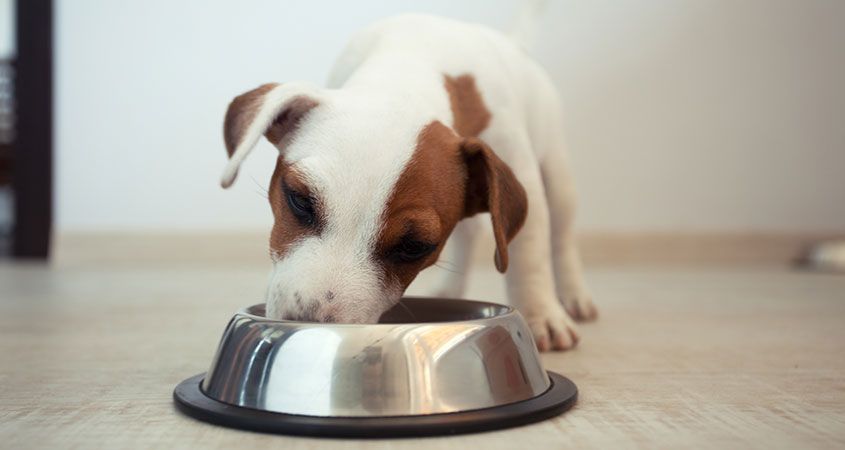4 Essential Nutrients for Every Dog and How to Get Them
Giving your pet a wholesome diet is extremely important if you want them to have a long, healthy life free of illness and immobility in senior years. Since pets cannot choose what they eat and are dependent on you to provide them the right nutrition according to their age and weight, it is your responsibility to be well-informed about pet nutrition and the foods that support it.

To be healthy your dog requires the following nutrients in its daily diet: protein, healthy fats, carbs, vitamins and minerals. Sounds no different from human nutritional needs, right! While some experts say that, if tested, nearly every dog will be found deficient in one or other essential nutrient, long-term deficiencies can affect your pet’s body in multiple ways and trigger the onset of serious health conditions, from allergies to poor bones and joints to depression and even cancer.
Aside from a healthy diet, your dog needs plenty of fresh and clean water for hydration. Not getting enough water can leave your pet dehydrated and prone to health problems.
Here are the essential nutrients your dog needs, irrespective of its size, age or weight.
Proteins
Every living being needs protein to keep its body systems running. Proteins are the body’s building blocks—they are essential for cell formation and they help the body heal and recover at the cellular level. Proteins are also needed for immunity against allergies and illnesses.
Your dog must get adequate amounts of essential amino acids (the structural units that make up protein) from a protein-rich diet. You can also purchase ready-to-serve protein-rich dog treats to ensure your furry friend is getting this essential nutrient in the right quantity.
Fats (Omega-3 and Omega-6 Fatty Acids)
These essential fatty acids do a number of important things for your dog’s body. They support optimum bone and muscle growth, assist in the development and rejuvenation of body organs, improve heart health and keep the digestive system in good shape.
Pets deficient in omega-3 and omega-6 fatty acids are prone to a number of serious health concerns, including but not limited to skin allergies and infections, inflammation, digestion problems, eye infections, and so forth. This deficiency can also trigger behavioral issues in pets—which is even harder to manage.
Some common sources of fatty acids are chicken, fish and fish oil, walnut oil, flaxseed powder and flaxseed oil, corn and corn oil, coconut oil, soybean oil and sunflower oil. You can either add these to your pet’s meals or purchase a supplemental dog treat that’s rich in these specific nutrients.
Vitamins (A, B2, B6, D, E)
Your dog needs a daily supply of vitamins to keep its various body systems healthy and happy.
Vitamin A deficiency can weaken immunity, which itself is potent ground for other health problems such as skin and sight-related conditions. Some good sources of vitamin A include flaxseed, coconut oil, sweet potatoes, carrots and leafy greens.
Vitamins B2 and B6 deficiencies are associated with skin infections, weak liver, diarrhea, seizures, kidney problems, allergies and some forms of cancer. You can ensure your pet is getting sufficient B2 and B6 by feeding vegetables, whole and sprouted grains, oats, bananas, peanuts and peanut butter, brown rice and sweet potatoes.
While vitamin D3 is essential for bone and joint health, vitamin E is needed to for good eye health and to keep your pet’s muscles and nervous system functioning well. Sunlight is the best source of vitamin D, but if your dog doesn’t get to go out much during the day, you might want to look at vitamin D supplementation. Vitamin E can be obtained from corn, eggs, fish, peanut oil and almond oil.
Lastly, your pet needs adequate amounts of vitamin K (found in abundance in leafy greens), as a lack of this essential micronutrient can affect the body’s blood-clotting ability.
If changing your pet’s diet sounds overwhelming and cumbersome, you can opt for a more convenient way to give them wholesome nutrition by buying ready-to-use supplements for your dog that have been fortified with essential macro- and micronutrients.
Carbs
Carbohydrates convert food into energy and are therefore essential for your dog’s physical well-being. They are also a great source of fiber, which is needed for the digestive system to work properly. Oats, barley, corn, wheat and brown rice are some of the best sources of complex carbs.
Lastly, make it a habit to check the nutritional content of everything that you feed your dog.


